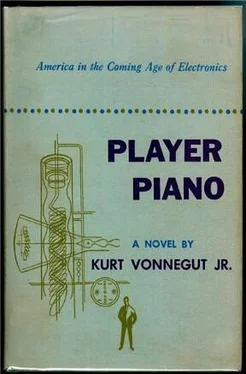"Umm hmmm. See that pit right there?" He held the muzzle of the gun a few inches from Paul's face and pointed out a tiny flaw. "That's what happens if you let a bore go for even a month. They'll run right away with you."
"Yessir."
"He isn't to be trusted any more, Paul. He isn't right in his head, and it wouldn't do to take chances with him, would it?"
"Nossir."
Kroner dabbed at the pit with the corner of a patch. "I supposed you saw it that way. That's why it's a little difficult for me to understand why you let him wander around the plant unescorted."
Paul reddened. No words came.
"Or why you'd let him have your gun. He isn't authorized for firearms any more, you know. Yet they tell me they found your pistol covered with his fingerprints."
Before Paul could order his thoughts, Kroner clapped him on his knee and laughed like Santa Claus. "I'm so sure you've got a good explanation, I don't even want to hear it. Got a lot of faith in you, my boy. Don't want to see you get into any trouble. Now that your father's gone, I feel it's sort of up to me to watch out for you."
"That's nice of you, sir."
Kroner turned his back to Paul, assumed a ready stance with the shotgun, and picked off an imaginary bird flushed from behind the desk. "Kaplowie!" He ejected an imaginary shell. "These are dangerous times - more dangerous than you'd suspect from the surface. Kaplowie! But it's also the Golden Age, isn't it, Paul?"
Paul nodded.
Kroner turned to look at him. "I said, isn't this the Golden Age?"
"Yessir. I nodded."
"Pull!" said Kroner, apparently imagining clay pigeons now. "Kaboom! There have always been doubters, criers of doom, stoppers of progress."
"Yessir. About Finnerty and the pistol, I -"
"Behind us now, forgotten," said Kroner impatiently. "The slate is clean. As I was about to say, look where we are now, because men went right ahead and took forward steps with stout hearts, in spite of the people telling them not to."
"Yessir."
"Kaplowie! Some men try to make light of what we're doing, what men like your father did, by saying it's just gadgeteering, blind tinkering. It's more than that, Paul."
Paul leaned forward, eager to hear what this extra quality might be. He'd felt for some time that everyone else in the system must be seeing something he was missing. Perhaps this was it, perhaps the beginning of an overwhelming fervor like his father's.
"It's a sight more than gadgeteering, I'll tell you, Paul."
"Yessir?"
"It's strength and faith and determination. Our job is to open new doors at the head of the procession of civilization. That's what the engineer, the manager does. There is no higher calling."
Dejectedly, Paul let his spine sag back in the chair.
Kroner put a fresh patch on the cleaning rod and began swabbing the bore again. "Paul -Pittsburgh is still open. The field has been narrowed down to two men."
It was somewhat startling that he said it just that way, the way Anita had said he would. He wondered what it was she thought he should say in response. He'd never given her a chance to say, and hadn't read the outline. "It's a wonderful chance to be of real service," he said. He supposed that was pretty close to what she had in mind.
Paul felt lightheaded, having borrowed Anita's thoughts for want of enthusiasm of his own. He was being offered the Pittsburgh job, lots more money, and, since he would have risen so high with the greater portion of his life still ahead, the assurance that he would almost certainly go clear to the top. The moment of his arrival at this point of immense good fortune was curiously bland. He had known it was coming for a long time. Kroner had wanted it for him and had come close to promising it to him often - always in the name of his father. When advances had come, as now, there had been a vestigal sort of ritual of surprise and congratulation, as though Paul, like his ancestors, had arrived by cunning, tenacity, and God's will or the Devil's laxness.
"It's a tough decision, Paul, between you and Fred Garth." Garth was a much older man, nearly Kroner's age, manager of the Buffalo Works. "Frankly, Garth hasn't got your technical imagination, Paul. As a manager he's excellent, but if it wasn't for prodding, the Buffalo Works would be just as it was when he took over five years ago. But he's steady and reliable, Paul, and there's never been any question that he was one of us, that he put progress and the system ahead of his own interests."
"Garth's a fine man," said Paul. Garth was, too: foursquare, desperate to please, and he seemed to have an anthropomorphic image of the corporate personality. Garth stood in relation to that image as a lover, and Paul wondered if this prevalent type of relationship had ever been given the consideration it deserved by sexologists. On second thought, he supposed that it had - the general phenomenon of a lover's devotion to the unseen - in studies of nuns' symbolic marriages to Christ. At any rate, Paul had seen Garth at various stages of his love affair, unable to eat for anxiety, on a manic crest, moved to maudlin near-crying at recollections of the affair's tender beginnings. In short, Garth suffered all the emotional hazards of a perennial game of she-loves-me, she-loves-me-not. To carry out directions from above - an irritating business for Paul - was, for Garth, a favor to please a lady. "I'd like to see him get the job."
"I'd like to see you get the job, Paul." Kroner's expression indicated that the mention of Garth had been so much window dressing. "You've got imagination and spirit and ability -"
"Thank you, sir."
"Let me finish. Imagination, spirit, and ability, and, for all I know, I may be completely wrong in calling your loyalty into question."
"Loyalty?"
Kroner laid the shotgun aside and pulled up a chair to face Paul's. He laid his big hands on Paul's knees and lowered his thick brows. The situation had the quality of a séance, with Kroner as the medium. Again, as he had felt when Kroner took his hand at the Country Club, Paul felt his strength and will dwarfed by the old man. "Paul, I want you to tell me what's on your mind."
The hands on his knees tightened. Paul struggled resentfully against the urge to pour his heart out to this merciful, wise, gentle father. But his sullenness decayed. Paul began to talk.
His formless misgivings and disquiet of a week before, he realized, had shape now. The raw material of his discontent was now cast in another man's molds. He was saying what Lasher had said the night before, talking about the spiritual disaster across the river, about the threat of revolution, about the hierarchy that was a nightmare to most. The way he phrased it, it wasn't a condemnation, it was a plea for refutation.
Kroner, his hands still on Paul's knees, hung his head lower and lower.
Paul came to the end, and Kroner stood and turned his back to stare out of the window. The spell was still in force, and Paul looked expectantly at the broad back, waiting for wisdom.
Kroner turned suddenly. "So you're against us."
"I didn't mean to say that, certainly. They're questions that deserve some sort of answer."
"Keep to your own side of the river, Paul! Your job is management and engineering. I don't know what the answers are to Lasher's questions. I do know that it's far easier to ask questions than to answer them. I know that there have always been questions, and men like Lasher ready to make trouble by asking them."
"You know about Lasher?" Paul hadn't mentioned his name.
"Yes, I've known about him for quite some time. And, as of this noon, I know what you and Lasher and Finnerty were up to last night." He looked sad. "As district industrial security officer, there isn't much I don't know, Paul. And sometimes, like now, I wish I didn't know so much."
Читать дальше








![Курт Воннегут - Вампитеры, фома и гранфаллоны [litres]](/books/397997/kurt-vonnegut-vampitery-foma-i-granfallony-litre-thumb.webp)